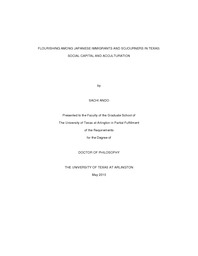| dc.description.abstract | Are immigrants in the United States flourishing? What constitute flourishing life among them? This cross-sectional, survey study focused on the role of social capital and acculturation to American society on flourishing among the purposive sample of Japanese immigrants and sojourners living in Dallas/Fort Worth, Texas, USA. A total of 380 cases were used to test the hypothetical model of flourishing through structural equation modeling. The majority of the participants was female, in their 30s and 40s, married, fairly high socioeconomic status, and employed. The average lengths of stay in the United States were almost 10 years. Confirmatory factor analysis revealed that all the measurement models of flourishing, social capital, and acculturation to American society were reliable and valid with no or a few modifications. The MIMIC model was not included in the final model because of its poor fit (the CFI = .887, the TLI = .830, the RMSEA = .143, Chi-Square = 122.28, df = 14, p < .05). The final full structural model yielded an adequate fit (the CFI = .921, the TLI = .906, the RMSEA = .067, Chi-Square = 345.48, df = 128, p < .05). Among the sample of Japanese immigrants, demographic variables, including gender, English proficiency, and lengths of stay in the United States were not associated with flourishing. Those with higher social capital were more likely to experience higher acculturation to American society (Beta = .531, p < .05) as well as flourishing (Beta = .494, p < .05). Higher acculturation to American society predicted higher flourishing (Beta = .264, p < .05). The intervening effect of acculturation was found in the relationship between social capital and flourishing. That is, those with higher social capital were more likely to be acculturated to American society, in turn, experienced higher flourishing. The positive approach is useful in understanding immigrant and sojourner adaptation because it takes a person-in-environment perspective that values the effect of social interactions on individuals' optimal wellbeing. The findings of the study yielded several important implications for social workers working with immigrants and sojourners. Social workers can promote wellbeing by helping them strengthen their existing social ties and to create new relationships that are mediated by both face-to-face and online contacts. Expanded social capital will enhance better acculturation to American society, which encourages better flourishing among Japanese immigrants and sojourners. For ever-growing global society, it is of great importance to examine immigration as positive experiences for both immigrants and the nation that welcomes them. | en_US |


